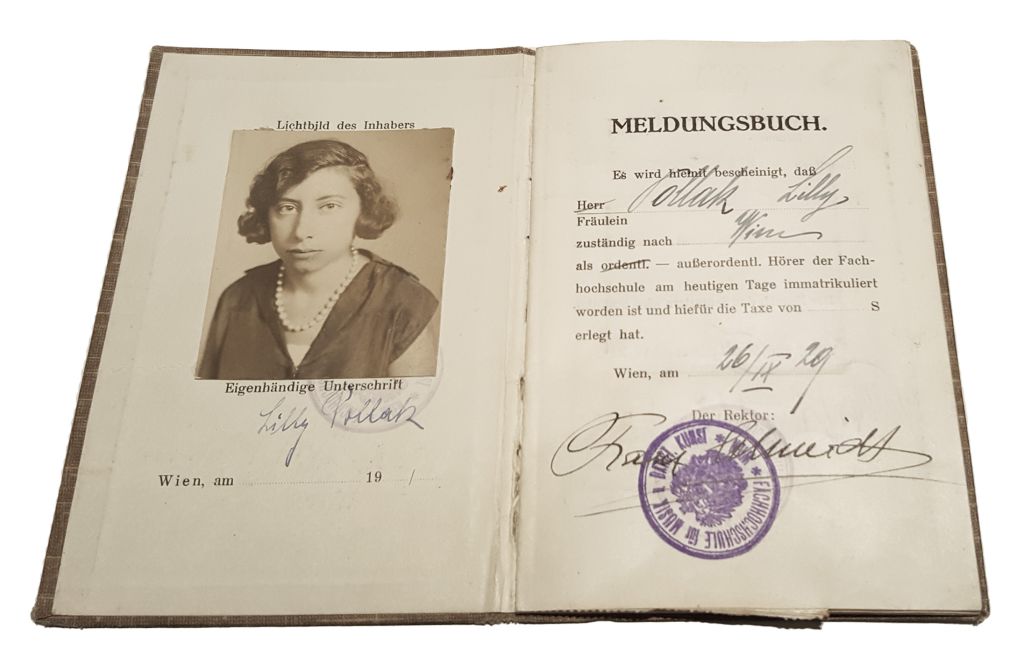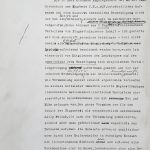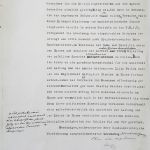Three podcasts created as part of the project Klingende Zeitgeschichte [Audible Contemporary History] take on the topic of institutional discontinuities at the mdw and its institutional predecessors. To create them, individuals all across the University worked to acoustically stage “peripheral stories” from the 20th century, efforts that have since made it possible to hear the archival documents themselves on multiple musical and linguistic levels. This pilot project, which was carried out from 2019 to 2021, involved a total of over 50 teachers, students, and researchers.
Three podcasts created as part of the project Klingende Zeitgeschichte [Audible Contemporary History] take on the topic of institutional discontinuities at the mdw and its institutional predecessors. To create them, individuals all across the University worked to acoustically stage “peripheral stories” from the 20th century, efforts that have since made it possible to hear the archival documents themselves on multiple musical and linguistic levels. This pilot project, which was carried out from 2019 to 2021, involved a total of over 50 teachers, students, and researchers.
The Case of Lilly Pollak
Among the three peripheral stories to be acoustically staged was that of Lilly Pollak. In July 1931, the newspaper Arbeiter Zeitung reported on protests against Austria’s newly implemented Music Academy Act: the student union of the Academy of Music and Performing Arts was opposing an authoritarian reform championed by Academy President Karl Wiener that entailed higher tuition, longer degree programmes, cuts to the numbers of students and faculty, and elimination of both the associated Fachhochschule and the Reinhardt Seminar. According to this report, the protest movement’s efforts had been successful in its opposition to a likewise newly imposed system of ad hoc knock-out examinations: while these exams had been eliminated, Lilly Polak—who chaired the organisation of socialist music students—was to be expelled from the Academy as a troublemaker. The mdw Archive holds a letter written by the Academy president to Emmerich Cermak, who was serving as Minister of Education, in which the former explains why the requests to “allow [Pollak] to remain a pupil” would have to be refused. Karl Wiener viewed her political activities, which included the printing and distribution of flyers calling for the “freedom of education”, as “an enormous danger”.

Lilly Pollak was not to resume her studies as a “pupil” at the Academy of Music. Instead, 1932 saw her enrol at the philosophical faculty of the University of Vienna, from which she ultimately received her doctorate in 1938. That same year, she fled to Australia via Switzerland and France along with her mother Ida, her brother Egon (who had likewise studied at the Academy of Music), and her first husband Wolfgang Speiser. During their journey, Egon suffered a nervous breakdown and ended up spending the rest of his life in a Swiss sanatorium, from where he wrote letters to his mother that included sketches for compositions. After World War II had ended, Lilly attempted to make a new start in Vienna together with her mother and husband. While Wolfgang Speiser was able to continue his career in the Socialist (and later Social Democratic) Party that had been interrupted in the 1930s, Lilly Pollak found post-war Vienna intolerable. Following her death, a cousin wrote in an obituary that in 1963, the “shadow of National Socialism” moved her to leave Vienna once more and go to England. She thereafter lived in London together with her second husband Paul Rosenow, her daughter Eve, and her stepdaughter Ruth. She pursued work there as a piano teacher and also paid multiple visits to family in Australia, where she ultimately died of complications from a hip operation at 84 years of age in 1993.
A Contemporary Archaeology of the mdw
Step by step, on visits to the mdw Archive and to the Verein der Geschichte der ArbeiterInnenbewegung [Association for the History of the Labour Movement] as well as through correspondence with Lilly Pollak’s descendants, the contours of this rebellious music student grew clearer and clearer. Pollak’s life was repeatedly overshadowed by institutional, political, racist, and anti-Semitic violence. In order to extract her history from these shadows, some of which reach into the present, it is necessary to venture out onto the margins of traditional institutional history in order to place the “enormous danger” that Lilly Pollak, as a politically active student, had embodied in the eyes of the Academy president in the appropriate contemporary historical context, thereby honouring the courage that is to this day inherent in all efforts to combat the actual “enormous danger” represented by authoritarian disempowerment, by the revocation of self-determination and the right to have a say.
In its podcasts, the project Klingende Zeitgeschichte has concerned itself with just such peripheral stories—stories in which acts of resistance, dissonances, and divergences played a role—and developed a format capable of lending the mdw’s history more depth in the present on multiple artistic and scholarly levels. As part of an mdw-wide transdisciplinary collaborative effort, starting points were conceived for a contemporary archaeology of the mdw as part of which instrumentalists, composers, actors, researchers, and Tonmeisters can create ways in which to access our Archive and thus our institution’s history.
At these three podcasts’ official presentation, which took place at the Sound Theatre on 1 April, many of the project participants emphasised the significance of this interdepartmental collaboration: the findings of the musicological and cultural studies-based archival research were used to create a scenic collage of texts that were then set to music by students and graduates of the composing programme, read by students of the Max Reinhardt Seminar, played by mdw instrumentalists, and arranged by mdw Tonmeisters.
The history of the mdw and its institutional predecessors is polyphonic in nature, and a transdisciplinary practice of remembrance can provide the various registers to be found therein with the space and the stage that they deserve.




